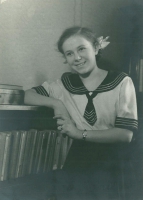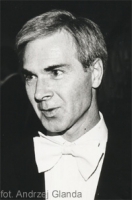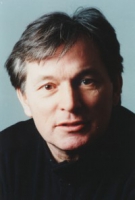There are few composers whose personality was reflected in their oeuvres as directly as in the case of Tomasz Sikorski. The music he wrote, the means he used, the way he looked for and selected those means – all this stemmed directly from his personality. With time, in successive works, this parallel became increasingly evident.
Character – except for traits inherited from parents and some predispositions – is shaped by various events in one’s life and by one’s environment. In the case of Sikorski, his huge sensitivity confronted with brutal reality, to which he was unable to adapt and which he was unable to understand or at least accept, provoked – to some extent against his will – aggression, rejection and withdrawal. This is mentioned by the composer’s sister, Ewa Sikorska:
He was a man of an incredible amplitude of personality, a blend of contradictions and paradoxes, a hypersensitive individual who was deeply affected by everything. He had something inspiring in him, he could be wonderful, show class and generosity. But he could also be cruel and mean. He himself suffered because he was like that.
She also explains why Sikorski was not well adapted to functioning in the world around him:
As children, we were cocooned and that is why we remained immature for a long time. Tomek’s umbilical chord was never cut.
It would be difficult to say that Tomasz Sikorski ever settled down – both in artistic and personal terms. He never sought anything. Of course, he did take advantage of the opportunities that came his way (performances or commissions) as best as he could, but if no new offers came, he did not fight for them. It was similar with friends – he did not know how to get on the right side of them; another barrier to closer relationships was undoubtedly his difficult and unstable temperament. As Zygmunt Krauze recalls:
The financial problems later on in his life were caused by the fact that he lacked resourcefulness, he was unable to organise his life, to get his act together. He was helpless. [...]
He had problems with women; he had this wonderful first girlfriend, Teresa, and he lost her somehow, then he could not find his way for years and did not have a partner; in fact, he was alone, really alone, there were some friendships, but not very important, and it could be said that Natalia took care of him.
This is confirmed by Leonia Piwkowska:
He was not successful in his private life. He was very lonely. He was unable to pull himself together. He did not agree with his own self, he kept trying to escape from himself. People couldn’t bear his terrible despair and incredible aggression.
Yet Sikorski was by no means the intelligent loser type, who liked to stay on the sidelines. He could be very dogged in fighting for what he fought was his, not mincing his words and stopping at nothing, though it was usually about trivial, minor matters, with regard to which he tried to prove – for the sake of principle, it would seem – that he was right. Such behaviour was extremely provocative. As Zygmunt Krauze recalls the time spent in the secondary school:
He provoked aggression and aversion in people by his behaviour. This also applies to the time in secondary school, when he was still in Łódź. Not everyone was like that, so he must have had in him something that irritated people and he thought he had the right, that he could act in the way he did. He got beaten up because of that, both literally and metaphorically, he was simply like that. I didn’t notice it then, because when you’re close together, you don’t see things this way, but when I look at it now, it was really very irritating – his behaviour.
Zbigniew Rudziński says, on the other hand:
He was a kind of – again I’ll use too strong a word – a kind of mental masochist, not physical, he really was like that. This was manifested in very straightforward situations, when, for example, instead of turning on his heel and leaving, and not arguing with policemen, he would argue with them. And he would go everywhere, making complaints everywhere. He was right in many respects, but when he made a scene at a restaurant or cafe, this certainly wasn’t right. He would go and make these complaints, all the time.
When he got the bit between his teeth, dug his heels in, he wouldn’t let go until he had his way. This usually ended in shouting matches and rows. These were times when customers had much less to say than today. In August 1980 an incident took place, clearly showing what Sikorski was capable of. In an official statement sent to the Polish Composers’ Union we can read:
On 11 August 1980, at about 0:20 am in ul. Piękna, Warsaw, in front of the ‘Habana’ restaurant, being under the influence of alcohol, he used vulgar words in public, committing an offence against public order.
Sikorski’s visit to that establishment cost him 3000 zlotys and information about the fine was made public at the office of the Polish Composers’ Union. The composer must have been displeased with the service and did not fail to let the staff know. Sikorski also regularly visited housing departments and building managers (especially after his move to the flat in Pl. Konstytucji), constantly complaining, making demands and, when he realised he would achieve nothing, making scenes and hurling abuse and everyone.
This is how Szábolcs Esztényi describes Tomasz Sikorski’s character:
He was even repulsive in his ‘manner’, treating everyone in a very strange, nonchalant fashion – he would cut people off mid-sentence, turn on his heel and leave; he wasn’t too nice or sociable. Then I learned from Zygmunt [Krauze] and from a few other people that he was well-known for his supposed short-temper, sudden mood swings and lack of restraint.
John Tilbury, on the other hand, recalls:
I recall he was quick-tempered, volatile; he did not suffer fools gladly. His speech was quick and precise, as were his movements. ‘Quickly, quickly,’ he would exhort his friends.
Sikorski once told him:
You know, John, I fall asleep angry and I wake up angry.
Sikorski seemed to show no consideration for anyone and anything. This was his authentic attitude, stemming, however, not from egotism but from his uncompromising nature. For the most important thing for him was music. As Zbigniew Rudziński recalls, Sikorski would sometimes suddenly fall silent during a meeting and would get out without saying a word. Sometimes, too, when he was a lecturer at the State School of Music in Warsaw, he would lock himself in a room, disregarding the fact he was supposed to be conducting classes. This is how Zygmunt Krauze interprets such events:
This fits in with his arrogance, not showing any consideration for people, situations or certain norms. It wasn’t a pose, he was incredibly authentic and uncompromising, that is, he did what he felt like doing, regardless of the consequences. It could be said that he was simply disliked by many people because of his behaviour.
This doggedness in Sikorski, his uncompromising attitude in asserting his rights, his persistence in explaining his position – persistence knowing no moderation, it would seem – was reflected in his works: in repetitions, seemingly endless, of short modules. Zbigniew Rudziński remembers how this phenomenon was perceived:
Tomek’s repetitions really bothered people, they resented them. This music was – I’m looking for a word but all words seem banal to me... – it was tiring. I personally wasn’t tired, but it could be perceived like that – not only when listened to.
Ewa Sikorska recalls the composer’s method of working:
He always composed at the piano, playing chords repeated many times. He wrote with himself.
Zygmunt Krauze confirms this:
This was intuitive but also huge work, that is, he arrived at it very slowly, he polished his chords like an obsessed man, and accepted only those that he really liked, he was very strict and did not allow anything else.
He also mentions Sikorski’s incredible sensitivity and talks about his sources of inspiration:
Everyone is interested in painting, everyone is interested in poetry, but he really was deeply affected by all this, it was really his world. For example, later, when they lived in ul. Polna, there was a window, in which he often stood. And he could stand there for an hour or two. There was something... There must have been something – on the one hand loneliness and on the other a desire to take part in the world. His gazing through the window – this was probably the inspiration for his piece after Kafka.
Sikorski was very interested in philosophy and poetry. Such texts were of great inspiration to him, though it would be more correct to say that he looked in them for words expressing the state of his soul. This was the case, for instance, with the excerpt from Kierkegaard included in Sickness unto Death, to mention just a part of it here:
... eternity asks of you and of every individual among these million millions only one question, whether you have lived in despair or not, whether you were in despair in such a way that you did not know you were in despair, or in such a way that you did hide this sickness in your inward parts as your gnawing secret, carry it under you heart as the fruit of a sinful love, or in such a way that you, a horror to others, did rave in despair.
Andrzej Chłopecki explains the use of this excerpt in the following manner:
This quote from Kierkegaard is very significant – it could be treated as the Danish philosopher’s prose rendition of the Polish composer’s existential problem. The autobiographical significance of the choice of this particular fragment was revealed at its most intense only after Tomasz Sikorski’s death, lending an air of tragedy to him.
It is difficult to point unequivocally to the sources of the existential problem which undoubtedly plagued the composer all his life. Perhaps it was his ‘cocooned’ upbringing, his hypersensitivity, or perhaps growing up without his parents. His father was always absent and his mother died, when her son still needed her a lot.
This is how Zygmunt Krauze talks about the loss of young Tomasz Sikorski’s mother and his loneliness:
Tomek was very close to his mother and losing her at that moment and in such a way consolidated his loneliness; I think he was always a great loner, even when we were very close friends. I remember how on one occasion we left Professor Stark’s place after a beautiful evening, having drunk some wine, and Tomek suddenly erupted into a fit of not anger but some incredible bitterness and mental pain. He leaned against a wall and started to cry. I simply didn’t know what to do. Everything seemed so fine, we were together and with Professor Stark, and we had all this music, and delicious food, and everything seemed wonderful, and yet it provoked this explosion of huge despair in him; this moment is very important to me, because this was the only time when he showed who he really was, he showed how terribly lonely he was and how terribly desperate he was. This was a mental state which, at least as I can see it now, could not be helped.
He also mentions Sikorski’s remarkable obsession with death:
He thought about death, hence his interest in Kafka or Kierkegaard, he talked about death very often, always, as I remember, very seriously and very realistically; we were so different in this respect. I have never been fascinated by it and I am still not fascinated, but in his case, it was present. This death of his mother, so tragic and sudden, must have strengthened his obsession with death.
Sikorski struggled with his character, yet he kept losing that battle. After a string of successes he achieved as a young man, when we was supposed to take over the responsibility for himself and his life, the tables turned. He turned out to be unprepared and unfit for the task. As if he lacked the sense of self-preservation, which was replaced by the virus or gene of self-destruction. This is what Ewa Sikorska says about her brother’s inner struggle:
He felt very alienated in life. He was a loner who hated loneliness. He became a loner by choice, preventing anyone from having access to him and helping him. There was a lot of self-destruction in him. He was absurdly uncompromising, also in his work, he paid for everything himself, in every sense of the word.
Tomasz Sikorski’s struggles with his own personality are perfectly summed up by Szábolcs Esztényi:
I think he was extraordinarily honest with regard to what he himself had unleashed in his art and in his life. In fact, all his art was his life. Once, when I was writing a posthumous tribute after his passing, I said that he had given his all in his lonely search for the almost lost mystery. I think that may have been it, he was giving his all, was consumed by it completely, that is, he unleashed a maelstrom and was dragged into it.








